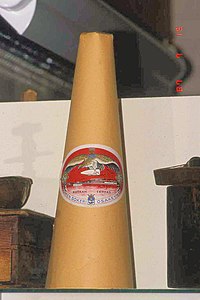
Semi‐polar root exudates in natural grassland communities
Sign Up to like & getrecommendations! Published in 2019 at "Ecology and Evolution"
DOI: 10.1002/ece3.5043
Abstract: Abstract In the rhizosphere, plants are exposed to a multitude of different biotic and abiotic factors, to which they respond by exuding a wide range of secondary root metabolites. So far, it has been unknown… read more here.
Keywords: semi polar; root; root exudates; species specific ... See more keywords

Differences in seasonal survival suggest species‐specific reactions to climate change in two sympatric bat species
Sign Up to like & getrecommendations! Published in 2019 at "Ecology and Evolution"
DOI: 10.1002/ece3.5292
Abstract: Abstract Long‐lived animals with a low annual reproductive output need a long time to recover from population crashes and are, thus, likely to face high extinction risk, if the current global environmental change will increase… read more here.
Keywords: seasonal survival; bat species; species specific; climate change ... See more keywords

Choosy cannibals: Targeted consumption of conspecific hatchlings by larval cane toads is triggered by species‐specific defensive toxins
Sign Up to like & getrecommendations! Published in 2022 at "Ecology and Evolution"
DOI: 10.1002/ece3.8655
Abstract: Abstract In many species, cannibalism is uncommon and involves nonselective consumption of conspecifics as well as heterospecifics. However, within their invasive Australian range, cane toad larvae (Rhinella marina) specifically target and voraciously consume the eggs… read more here.
Keywords: triggered species; consumption; cane; bufadienolide toxins ... See more keywords

Decision support for aquatic restoration based on species‐specific responses to disturbance
Sign Up to like & getrecommendations! Published in 2022 at "Ecology and Evolution"
DOI: 10.1002/ece3.9313
Abstract: Abstract Disturbances to aquatic habitats are not uniformly distributed within the Great Lakes and acute effects can be strongest in nearshore areas where both landscape and within lake effects can have strong influence. Furthermore, different… read more here.
Keywords: disturbance; restoration; lake disturbance; abundance ... See more keywords

Effects of fructooligosaccharides (FOS) on the composition of cecal and fecal microbiota and the quantitative detection of FOS-metabolizing bacteria using species-specific primers.
Sign Up to like & getrecommendations! Published in 2022 at "Journal of the science of food and agriculture"
DOI: 10.1002/jsfa.11884
Abstract: BACKGROUND Fructooligosaccharides (FOS) are a kind of prebiotic. Previous studies concerning the effect of FOS on intestinal microbiota have focused on Bifidobacterium and Lactobacillus. However, the presence of other FOS-utilizing bacteria makes it necessary to… read more here.
Keywords: microbiota; specific primers; composition; abundance ... See more keywords

Dieback and expansions: species-specific responses during 20 years of amplified warming in the high Alps
Sign Up to like & getrecommendations! Published in 2019 at "Alpine Botany"
DOI: 10.1007/s00035-019-00230-6
Abstract: The largest alpine–nival vegetation permanent plot site in the Alps, the GLORIA mastersite Schrankogel (Tirol, Austria), provided evidence of warming-driven vegetation changes already 10 years after its establishment in 1994. Another decade later, in 2014, substantial… read more here.
Keywords: nival species; dieback expansions; subnival nival; species specific ... See more keywords

Aboveground herbivores drive stronger plant species-specific feedback than belowground fungi to regulate tree community assembly.
Sign Up to like & getrecommendations! Published in 2021 at "Oecologia"
DOI: 10.1007/s00442-021-04868-0
Abstract: Ectomycorrhizal (EcM) tree species often become more dominant than arbuscular mycorrhizal (AM) tree species in temperate forests, but they generally coexist. Theory predicts that ecological feedback mediated by aboveground herbivory and/or belowground microbes could explain… read more here.
Keywords: plant; plant species; tree; species specific ... See more keywords

Individuality, species-specific features, and female discrimination of male southern white rhinoceros courtship calls.
Sign Up to like & getrecommendations! Published in 2022 at "Animal cognition"
DOI: 10.1007/s10071-021-01591-4
Abstract: Male vocalizations associated with courtship can play a key role in mate selection. They may help females obtain information about males' quality and identity and/or may contain species-specific properties that help prevent interspecies breeding. Despite… read more here.
Keywords: species specific; male; hic calls; individuality species ... See more keywords

Prenatal Sensory Stimulation Induces BDNF Gene Expression in the Brain and Potentiates the Development of Species-Specific Predisposition in Newborn Chicks
Sign Up to like & getrecommendations! Published in 2018 at "Bulletin of Experimental Biology and Medicine"
DOI: 10.1007/s10517-018-4320-6
Abstract: We studied the effects of light and non-specific sound stimulation of domestic chick embryos on their filial preference as well as on the expression of two transcriptional factors c-Fos and Egr-1 and neurotrophin BDNF in… read more here.
Keywords: development species; stimulation; species specific; expression ... See more keywords

Analysis of the allelic variation in the Shell gene homolog of E. oleifera and design of species specific Shell primers
Sign Up to like & getrecommendations! Published in 2019 at "Euphytica"
DOI: 10.1007/s10681-019-2538-7
Abstract: The “shell thickness” gene (Sh) controls three fruit types in African oil palm [Elaeis guineensis (Eg)] and has important implementations for variety development. Eg plantations in South and Central America suffer severally from the “Pudrición… read more here.
Keywords: allelic variation; species specific; shell; gene ... See more keywords

The evolution of (non)species-specific pheromones
Sign Up to like & getrecommendations! Published in 2020 at "Evolutionary Ecology"
DOI: 10.1007/s10682-020-10046-0
Abstract: Pheromones are chemical signals that elicit innate and stereotyped responses in conspecifics, often with intricate species specificity. The remarkable diversity of pheromones has made them particularly useful for studying the physiological and evolutionary mechanisms underlying… read more here.
Keywords: evolution; evolution non; species specificity; non species ... See more keywords